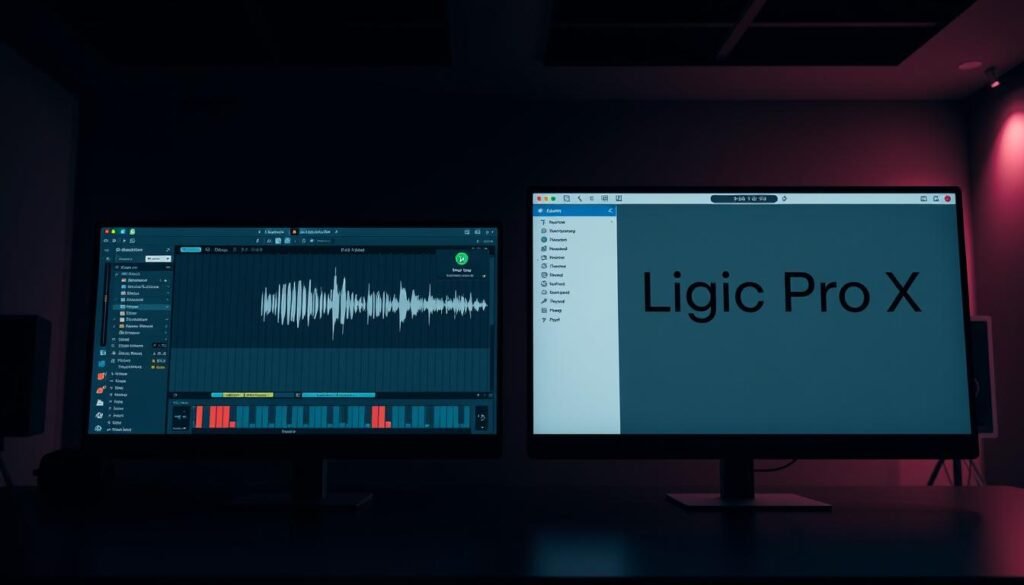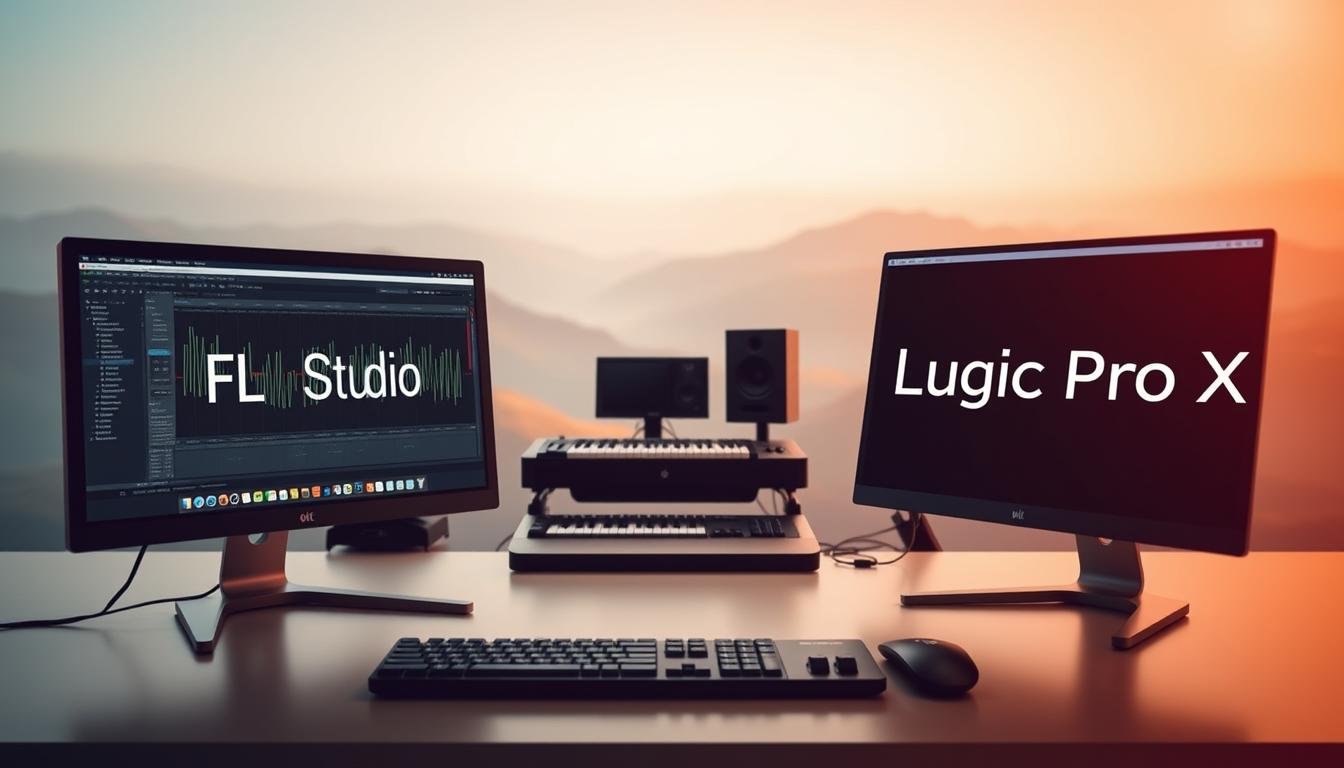Did you know 62% of music producers switch digital audio workstations at least once? Picking the right music production software can change your game. In this digital audio workstation review, we’ll explore FL Studio vs Logic Pro X.
As a music lover, choosing the right tools is crucial. The FL Studio vs Logic Pro X comparison is more than just features. It’s about finding the perfect partner for your music journey.
We’ll look at the main points of these two powerful music production software platforms. Whether you love electronic music or are a sound designer, this guide will help you choose. It will match your unique musical goals.
Key Takeaways
- FL Studio and Logic Pro X are top digital audio workstations.
- Each DAW has its own workflow for different music styles.
- Choosing the right software depends on your creative needs.
- Think about your budget, hardware, and music genre when picking.
- Both platforms have powerful tools for professional music making.
Overview of FL Studio and Logic Pro X
As a music producer, knowing the best digital audio workstation (DAW) is key. FL Studio and Logic Pro X are top choices, each suited for different needs and workflows.
FL Studio: A Versatile Music Production Powerhouse
FL Studio, by Image-Line, has grown from FruityLoops into a powerful tool. It’s known as one of the best DAWs for beginners. Its easy-to-use interface is great for electronic and hip-hop producers.
- Compatible with Windows and macOS
- Lifetime free updates
- Pattern-based workflow
- Extensive plugin support
Logic Pro X: Apple’s Professional Music Solution
Logic Pro X shows Apple’s dedication to top-notch music production. It has all the features of FL Studio, making it a strong choice for recording, editing, and mixing.
- Exclusive to macOS
- Seamless Apple ecosystem integration
- Advanced recording capabilities
- Professional mixing tools
Comparative Feature Highlights
| Feature | FL Studio | Logic Pro X |
|---|---|---|
| Price | Varies by Edition | $199.99 |
| Platform | Windows/macOS | macOS Only |
| Update Policy | Lifetime Free | Free App Store Updates |
Choosing between FL Studio and Logic Pro X depends on your specific music production goals and technical requirements.
Knowing about these tools helps you pick the right DAW for your vision and setup.
User Interface Comparison

Choosing the right digital audio workstation means understanding the differences in user interfaces. FL Studio and Logic Pro X have unique approaches that affect your music production. These differences are key when comparing audio editing software.
FL Studio’s Innovative Layout
FL Studio is known for its modular design, perfect for electronic music producers. Its interface is flexible, allowing for creative freedom. Key features include:
- Drag-and-drop functionality
- Customizable color schemes
- Highly adaptable window arrangements
Logic Pro X’s Professional Workspace
Logic Pro X has a traditional digital audio workstation layout. It’s linear and track-based.
| Feature | FL Studio | Logic Pro X |
|---|---|---|
| Interface Style | Modular, Flexible | Linear, Structured |
| Customization | Extensive | Limited |
| Best For | Electronic Music | Recording/Mixing |
Learning Curve Insights
FL Studio’s layout might be tough for beginners. Logic Pro X is easier to start with. The right choice depends on your personal workflow and musical goals.
Customization and Flexibility
FL Studio excels in personalizing the interface. You can map MIDI controllers and adjust colors. It lets you create a unique workspace. Logic Pro X, while less customizable, offers a polished environment.
Workflow and Production Features
When comparing music production software, FL Studio and Logic Pro X stand out. They offer different ways to make music. Each has its own strengths that can change how you work.
Music Composition in FL Studio
FL Studio is great for making electronic beats. It has features that make music creation easy and fun. These include:
- Intuitive step sequencer for complex rhythm creation
- Powerful piano roll with advanced MIDI manipulation
- Pattern-based workflow for rapid musical experimentation
Music Composition in Logic Pro X
Logic Pro X is known for its audio editing tools. It’s perfect for:
- Professional linear recording capabilities
- Advanced pitch correction and time-stretching
- Comprehensive track-based automation
Collaboration and Sharing Features
Today’s music production needs teamwork. Both platforms make sharing and working together easy.
Plugin and Instrument Support
A DAW’s strength comes from its ability to grow. FL Studio and Logic Pro X have big plugin libraries. This lets musicians add new sounds and effects to their music.
Choosing between these DAWs depends on your specific production style and creative goals.
Pricing and Availability
When looking for the best DAW for beginners, price is key. FL Studio has different packages for all budgets and skill levels. You can choose from the Fruity Edition to the All Plugins Edition.
Logic Pro X is priced at $200 for a one-time buy. It offers a full set of features for professional music production. This model is simple and gives you everything you need.
Choosing depends on your needs. FL Studio is great for beginners with its tiered pricing. Logic Pro X is better for pros with its full package. Think about your budget, goals, and workflow when deciding.
Both DAWs are great investments for your music journey. The most important thing is finding one that fits your budget and supports your creativity and skills.


